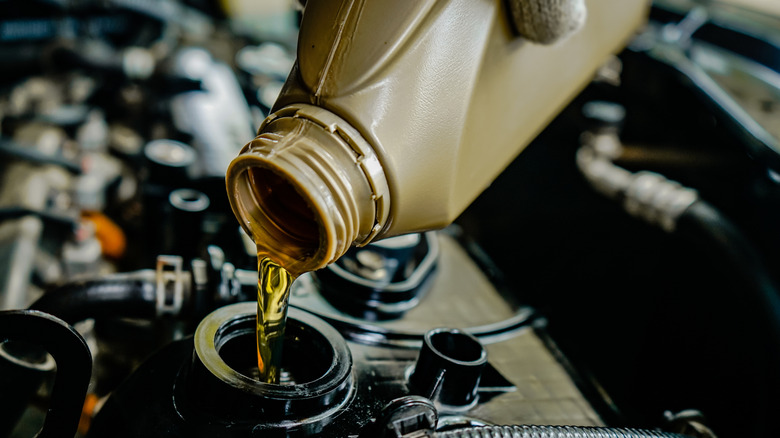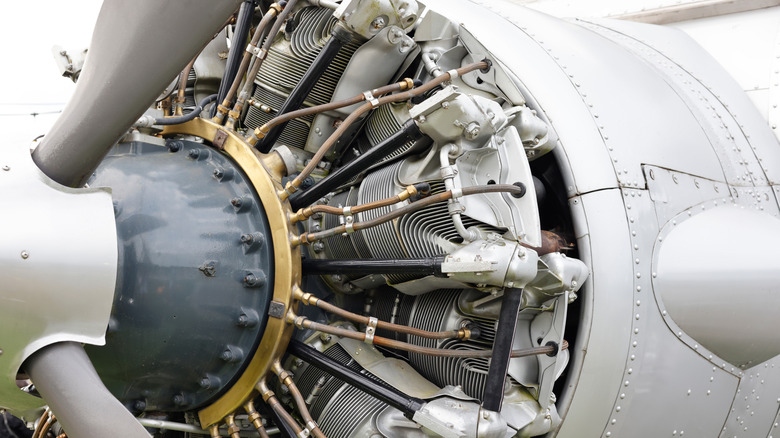What Kind Of Engine Oil Do Airplanes Use? (And Why You Can't Use It In Your Car)
No matter whether you run car, motorcycle, boat, or airplane, one common fact binding all these vehicles is that their engines all need oil. An internal combustion engine running at speed is a violent place, and that's largely due to all the moving parts within an engine. Parts like the pistons, valvetrain, camshaft(s), and crankshaft rotate at several thousand revolutions per minute. Without lubrication, these components would rub on the metalwork comprising the engine and the fasteners holding everything in place, generating an incredible amount of friction and eventually seizing the engine.
Each type of engine works best with a certain kind of oil, and aircraft engines are no different in this regard. While some aircraft use car engines like converted Volkswagen air-cooled powerplants, the majority of piston-powered planes use aircraft-specific engines, such as the Cessna 172's Continental or Lycoming units. Unlike regular car motor oil, these aircraft-specific engines utilize specialized aviation oil, produced by major oil companies like Shell and Phillips. There are two major types of oil in common usage: piston and turbine oil, for use in traditional reciprocating-piston and turbine-powered engines like jets, respectively.
Unlike automotive oils, aviation oils are usually ashless and don't have metallic additives or anti-wear detergents, both of which can damage the internals of aircraft engines. As such, putting aviation oil in a car engine is not recommended, as it may lead to premature wear. Let's discuss the specifics of why that is and the various needs of each engine type.
Using aviation-grade oil in a car
Aviation and automotive oils use the same oil classification systems, so you could pour a case of 15W-50 AeroShell aviation piston oil into an engine that accepts 15W-50 automotive engine oil without noticing an immediate difference, due to the identical weight. But the real issues will occur later on, because aviation and automotive engines are subjected to different environments and operating temperatures.
Aviation engines are generally air-cooled to save weight, since water and radiators weigh a considerable amount. So, they typically rely on airflow and the oil itself to carry heat away from the engine core, utilizing an oil cooler to manage temperatures. This means that the oil must perform at higher temperatures than in car engines, which is why aviation oils feature no additives. Detergents and metals like zinc don't react well when subjected to the high-heat environment of an aviation engine.
In other words, running aviation oil in a car is roughly equivalent to running an exorbitantly expensive conventional oil with no additives. Yes, the car will accept it, but automotive engine oils have additives for several important reasons. For example, zinc forms a protective barrier between metal parts, preventing metal-on-metal friction. Detergents, also not found in aviation oils, help break up impurities and deposits that build up over time, which would otherwise cause premature wear. If you want to top up your engine oil, you're better off with cheap basic engine oil.
Using automotive oil in a piston-engine aircraft
Automotive oil is typically far cheaper than aviation oil, sometimes up to 10 times cheaper, a potentially tempting proposition to lower costs. However, despite automotive and aviation piston engines relying on the same operating principles, they each incorporate different technology and so utilize different additives. Most piston aircraft engines were developed before metal-based additives like zinc became commonplace, and little has changed about their design since.
The fastest passenger airliners use modern jet engines due to their speed, altitude efficiency, and reliability advantages over piston engines, which still use technology dating back nearly a century. This type of engine requires oil designed with constraints that accommodate not just the heat dispersion of an air-cooled powerplant, but one not designed to accept metal-based additives or modern detergents. Plus, aircraft engines tend to burn much of their oil during normal operation.
Consequently, using automotive oil in an aircraft can cause significant issues aside from simple wear and tear. As the oil burns away, the zinc and detergents get left behind, forming deposits and contaminating the remaining oil. These deposits will rapidly build up as the aircraft burns more oil, which can eventually lead to pre-ignition within the combustion chamber. This is because the deposits themselves heat up to glowing-hot levels, igniting the fuel before the engine's supposed to (known as pre-ignition) and causing the pistons to melt. It's a phenomenon that has led to engine detonations and catastrophic consequences in the past, and it's why pilots should never tempt fate, despite aviation oil costing a pretty penny.


